Adecco Group Bundle
Who Really Controls Adecco Group?
Unraveling the ownership of a global HR titan like Adecco Group is key to understanding its strategic direction and future potential. From its inception through the merger of Adia and Ecco in 1996, Adecco Group has become a dominant force in the human capital sector. This analysis provides a comprehensive look at the company's ownership evolution, from its founders to its current major stakeholders.
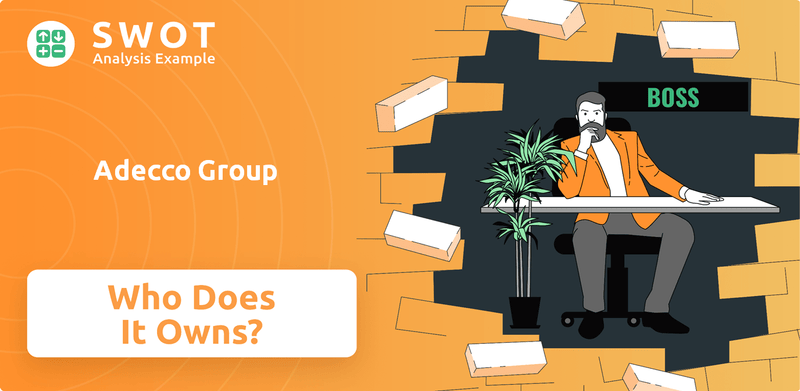
Understanding Adecco Group SWOT Analysis is essential for investors and stakeholders alike. This exploration of Adecco ownership will examine the shifts that have shaped its influence and direction, from its headquarters in Zurich to its global operations. Knowing who owns Adecco sheds light on its ability to navigate the complexities of the global workforce and its long-term vision, impacting its financial performance and market share.
Who Founded Adecco Group?
The Adecco Group emerged in 1996, born from the merger of Adia Interim, founded in 1957 by Henri Lavanchy, and Ecco, established in 1961 by Philippe Foriel-Destezet. This union created a global staffing leader, combining the visions of its founders to address evolving labor market needs. The merger signified a strategic move to consolidate ownership and establish a new shareholding structure for the combined entity.
Details regarding the exact equity splits at the inception of the Adecco Group are not readily available in the public domain. However, it is understood that the founding families and their initial investors held significant stakes in the newly formed company. This reflects the collaborative nature of the merger, aimed at achieving market dominance and integrating the core strategies of both Adia and Ecco.
Early backing for both Adia and Ecco likely came from private investors and institutional support. The merger itself was a strategic move to create a global leader. The combined entity's initial strategic direction and the distribution of control among the pre-existing shareholders of Adia and Ecco reflected the founders' visions.
Henri Lavanchy's Adia focused on flexible workforce solutions.
Philippe Foriel-Destezet aimed to broaden Ecco's presence across Europe.
The merger was a strategic move to create a global leader in staffing solutions.
Founding families and early investors held significant stakes in the new Adecco Group.
Early backing included private investors and potential institutional support.
The merger was a collaborative effort aimed at achieving market dominance.
The early ownership of Adecco reflects a blend of entrepreneurial vision and strategic investment. The founders, Henri Lavanchy and Philippe Foriel-Destezet, each brought unique strengths to the table, which were crucial in shaping the company's initial direction. While specific ownership details immediately after the merger are not widely available, the combined entity's structure was designed to leverage the strengths of both Adia and Ecco. To learn more about the company's growth, you can read about the Growth Strategy of Adecco Group.
Adecco Group SWOT Analysis
- Complete SWOT Breakdown
- Fully Customizable
- Editable in Excel & Word
- Professional Formatting
- Investor-Ready Format
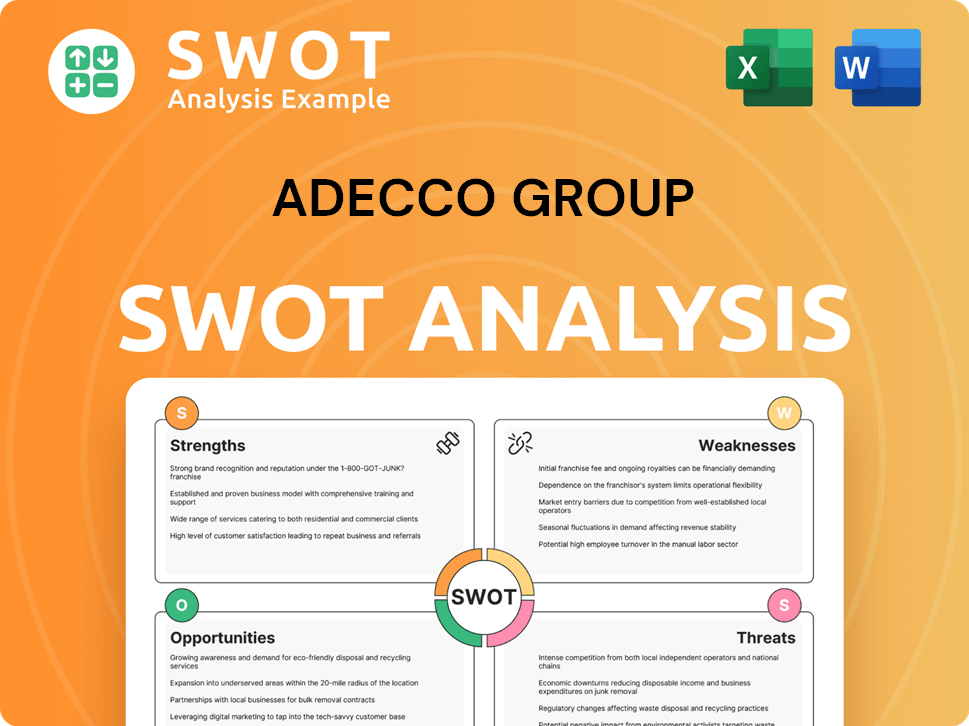
How Has Adecco Group’s Ownership Changed Over Time?
The ownership structure of the Adecco Group has changed considerably since its inception in 1996. The company went public on the SIX Swiss Exchange following its merger. Its market capitalization has fluctuated based on market conditions and the company's performance. Major shifts in shareholding often involve institutional investors, mutual funds, and index funds, which buy and sell significant portions of the company's shares. As of early 2024, institutional investors hold a significant part of Adecco's shares.
Significant individual shareholders, often former executives or long-term investors, also play a role in the ownership landscape. The company's annual reports and filings provide detailed breakdowns of share ownership. These reports, especially the most recent ones for 2023 and 2024, show the percentage of shares held by different types of investors. Changes in these holdings can affect company strategy and governance, as large institutional investors frequently engage with management on environmental, social, and governance (ESG) issues, as well as financial performance. For example, increased institutional ownership can sometimes lead to greater pressure for shareholder returns and corporate transparency. If you want to know more about the Target Market of Adecco Group, you can read it.
| Key Event | Impact on Ownership | Year |
|---|---|---|
| Merger of Adia and Ecco | Formation of Adecco Group; Initial public offering on SIX Swiss Exchange | 1996 |
| Institutional Investor Activity | Significant shifts in shareholding percentages; Influence on company strategy | Ongoing (2023-2024) |
| Changes in Executive Leadership | Potential shifts in individual shareholder holdings; Influence on company direction | Ongoing (2023-2024) |
Understanding who owns Adecco, and the shifts in its ownership structure, provides insight into the company's strategic direction and financial health. Major shareholders, including institutional investors like BlackRock and The Vanguard Group, significantly influence the company's governance and performance. The Adecco Group's financial reports and filings provide the most up-to-date information on ownership percentages and any changes that occur. Monitoring these reports helps in understanding the dynamics of Adecco ownership and its implications.
Adecco Group is a publicly traded company with a dynamic ownership structure.
- Institutional investors hold a substantial portion of the shares.
- Individual shareholders and executives also play a role.
- Changes in ownership can impact company strategy and governance.
- Annual reports provide detailed breakdowns of share ownership.
Adecco Group PESTLE Analysis
- Covers All 6 PESTLE Categories
- No Research Needed – Save Hours of Work
- Built by Experts, Trusted by Consultants
- Instant Download, Ready to Use
- 100% Editable, Fully Customizable
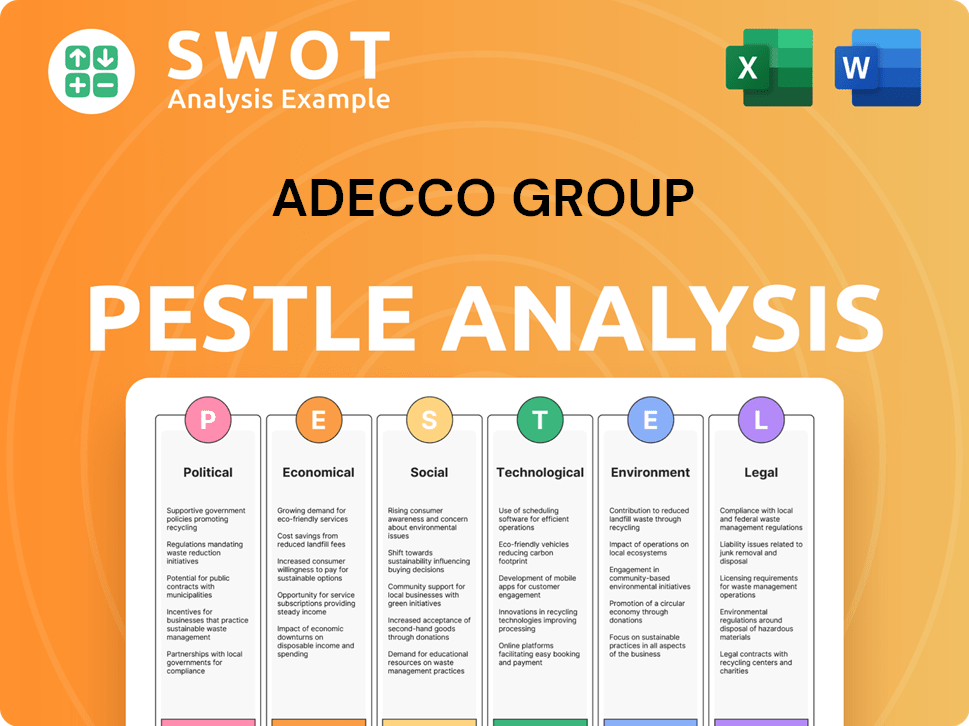
Who Sits on Adecco Group’s Board?
The current Board of Directors of Adecco Group is crucial for the company's governance and strategic direction. The board is composed of independent directors and those representing major shareholder interests. Information about the board members, including their professional backgrounds, is available in Adecco's annual reports and on their corporate website. This structure aims to bring a variety of skills and experiences to the company's leadership. As of early 2024, the board's composition reflects a commitment to diverse expertise to guide the company's operations and strategic initiatives.
The board's decisions are influenced by shareholder resolutions and market expectations. The board's role is to shape the company's strategic direction and operational policies. The board's structure and activities are designed to ensure effective oversight and to represent the interests of all shareholders. The board's composition and actions are designed to ensure effective oversight and to represent the interests of all shareholders.
| Board Member | Role | Key Affiliations |
|---|---|---|
| Denis Machuel | CEO | Previously held leadership positions at Sodexo |
| Jean-Christophe Deslarzes | Chairman | Independent Director |
| Monica Ribar | Vice-Chairwoman | Independent Director |
Adecco Group operates under a one-share-one-vote structure, meaning each share of common stock has one voting right. There are no special voting rights that would grant outsized control to specific individuals or entities. While there haven't been any major proxy battles or activist investor campaigns reported recently, the company remains subject to shareholder scrutiny. The company's approach to corporate governance is designed to ensure that all shareholders have a voice in the company's direction. The company's commitment to shareholder value is evident in its governance practices. For more insights, check out the Marketing Strategy of Adecco Group.
Adecco Group's governance structure is designed to ensure fair representation and effective oversight.
- The board includes a mix of independent directors and those representing shareholder interests.
- Voting rights are proportional to share ownership, ensuring equal voting power.
- Shareholder engagement plays a crucial role in influencing the company's strategic direction.
- The company is committed to transparency and accountability in its governance practices.
Adecco Group Business Model Canvas
- Complete 9-Block Business Model Canvas
- Effortlessly Communicate Your Business Strategy
- Investor-Ready BMC Format
- 100% Editable and Customizable
- Clear and Structured Layout
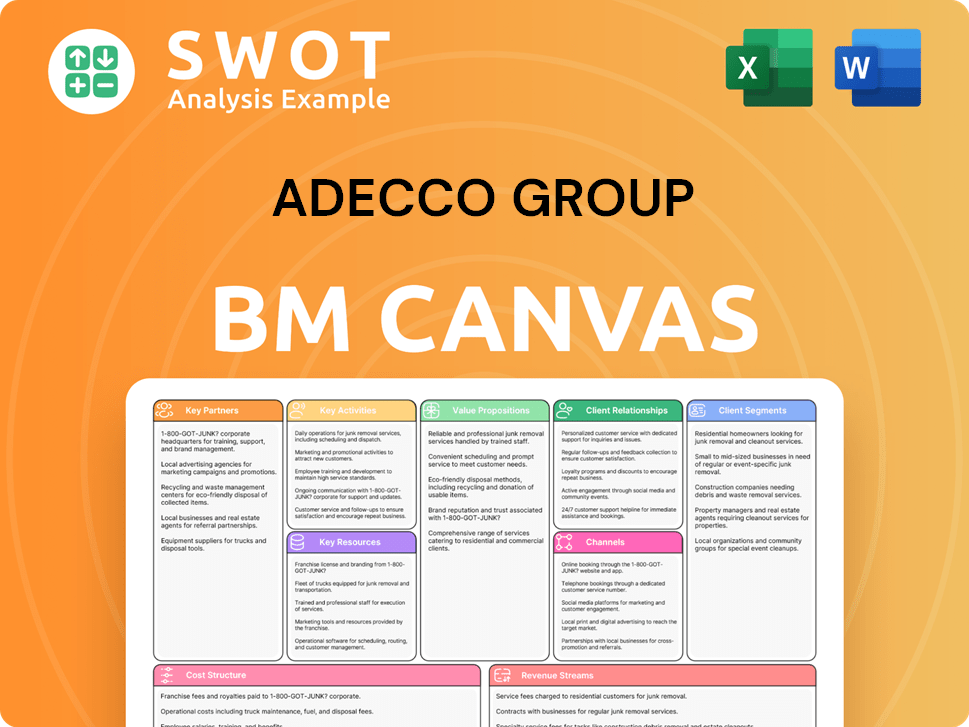
What Recent Changes Have Shaped Adecco Group’s Ownership Landscape?
Over the past few years (2022-2025), the ownership structure of Adecco Group, a key player in the HR services sector, has been influenced by the firm's strategic moves and broader industry trends. While significant shifts in ownership, such as large-scale share buybacks, haven't been a primary focus, the company has been actively involved in acquisitions and divestitures to optimize its portfolio. These activities, along with a focus on digital transformation and upskilling, are strategies that can attract new investors and potentially reshape the ownership base.
Leadership changes, including appointments of key executives, can also be indicators of potential shifts in ownership or investor sentiment. The increase in institutional ownership, a trend observed across various sectors including HR services, is worth noting. This can lead to a more dispersed ownership base, while also concentrating voting power among major asset managers. For more details on Adecco Group's business model, consider reading Revenue Streams & Business Model of Adecco Group. Furthermore, the potential influence of activist investors and the company's strategic plans, as discussed in public statements and analyst reports, may indirectly touch upon future ownership changes.
| Metric | Latest Data | Source |
|---|---|---|
| Market Capitalization | Approximately $5.5 billion (as of May 2024) | Financial News |
| Institutional Ownership | Around 60-70% (estimated, varies) | Financial Reports |
| Revenue (2023) | Approximately 23.4 billion EUR | Adecco Group Annual Report 2023 |
The trends in the HR services industry, such as increasing institutional ownership, are relevant to understanding the evolution of Adecco ownership. The company's responses to market dynamics, including strategic acquisitions and digital transformation initiatives, also play a key role in shaping its investor profile. As of May 2024, the company’s market capitalization is around $5.5 billion, which provides a snapshot of its current valuation. The revenue for 2023 was approximately 23.4 billion EUR, according to the Adecco Group Annual Report 2023.
Adecco Group is a publicly traded company, with a significant portion of its shares held by institutional investors. These include large asset management firms and investment funds.
Yes, Adecco Group is a publicly listed company. The stock symbol is ADEN (SIX Swiss Exchange).
Major shareholders typically include institutional investors such as investment funds and asset management companies. Specific details change over time.
Adecco Group headquarters are in Zurich, Switzerland.
Adecco Group Porter's Five Forces Analysis
- Covers All 5 Competitive Forces in Detail
- Structured for Consultants, Students, and Founders
- 100% Editable in Microsoft Word & Excel
- Instant Digital Download – Use Immediately
- Compatible with Mac & PC – Fully Unlocked
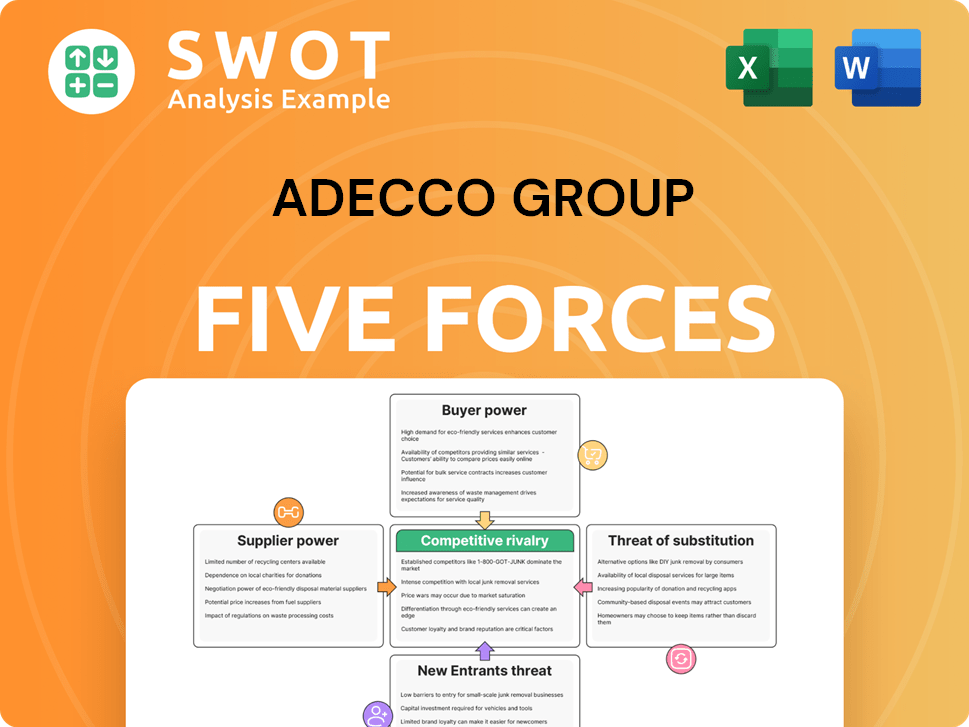
Related Blogs
- What are Mission Vision & Core Values of Adecco Group Company?
- What is Competitive Landscape of Adecco Group Company?
- What is Growth Strategy and Future Prospects of Adecco Group Company?
- How Does Adecco Group Company Work?
- What is Sales and Marketing Strategy of Adecco Group Company?
- What is Brief History of Adecco Group Company?
- What is Customer Demographics and Target Market of Adecco Group Company?
Disclaimer
All information, articles, and product details provided on this website are for general informational and educational purposes only. We do not claim any ownership over, nor do we intend to infringe upon, any trademarks, copyrights, logos, brand names, or other intellectual property mentioned or depicted on this site. Such intellectual property remains the property of its respective owners, and any references here are made solely for identification or informational purposes, without implying any affiliation, endorsement, or partnership.
We make no representations or warranties, express or implied, regarding the accuracy, completeness, or suitability of any content or products presented. Nothing on this website should be construed as legal, tax, investment, financial, medical, or other professional advice. In addition, no part of this site—including articles or product references—constitutes a solicitation, recommendation, endorsement, advertisement, or offer to buy or sell any securities, franchises, or other financial instruments, particularly in jurisdictions where such activity would be unlawful.
All content is of a general nature and may not address the specific circumstances of any individual or entity. It is not a substitute for professional advice or services. Any actions you take based on the information provided here are strictly at your own risk. You accept full responsibility for any decisions or outcomes arising from your use of this website and agree to release us from any liability in connection with your use of, or reliance upon, the content or products found herein.